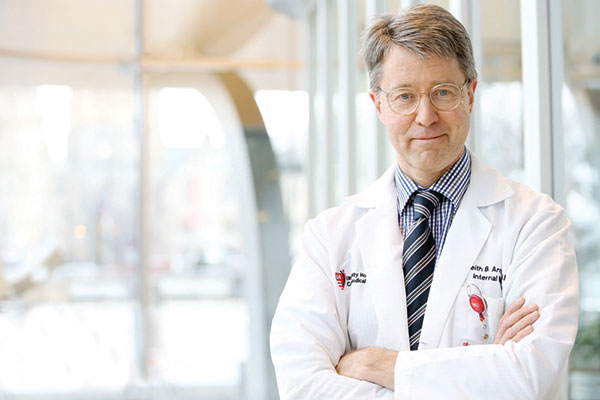Laser focused on Efficiency
November 01, 2021
Keith Armitage, MD, a recent “Dinner with the Doc” honoree, has helped spearhead an improved patient discharge process at UH Cleveland Medical Center
UH Clinical Update | November 2021
Discharging patients after a hospital stay, whether to a skilled nursing facility, rehabilitation center or home, is a complex process critical to preventing re-admissions.

But with the leadership of Keith Armitage, MD, the discharge process of acute care patients under the care of Internal Medicine residents at UH Cleveland Medical Center has been smoothed and improved.
Recently Dr. Armitage was one of eight physicians recognized as part of the “Cliff Appreciates” initiative for caregivers who demonstrate an exceptional Commitment to Value or who have Advanced Systemness. He was cited for driving value metrics and working with the staff to improve discharges for the Department of Medicine, and praised for his collaboration with residents and attending physicians, which led to improved engagement from both to make the process more efficient, as well as to reduce patients’ length of stay.
Dr. Armitage is a Professor of Medicine in the Division of Infectious Diseases at Case Western Reserve University – his expertise has made it highly likely that you’ve seen him interviewed on television news throughout the pandemic – and he is the Vice Chair for Education and Residency Director in the UH Department of Internal Medicine.
His primary professional focus has been on both postgraduate medical education and clinical infectious diseases.
Keith Armitage grew up in Lawrence, Ks., where his father was a professor of biology at the University of Kansas. “I was the first in my family to become a physician,” he says. He got his undergraduate degree from the University of Kansas and then went to the University of Colorado for medical school.
He arrived in Cleveland in 1986, for an internship and residency in Internal Medicine and then an Infectious Diseases fellowship at Case Western Reserve University; he has been with University Hospitals since then. He’s been the Residency Director of Internal Medicine since 1992. He lives just over a mile from UH Cleveland Medical Center, which allows him to walk to and from work.
“I’ve always been very involved in patient acute care operations because traditionally in internal medicine, residents do a lot of their training in acute care,” says Dr. Armitage. “When I started this job there were no non-teaching services – everything was done by residents. Now, though, a good bit of acute care is done by non-teachers.”
Acute care patients are in the ICU, rather than in the wards.
“Throughput processes are crucial in terms of the economics of running a big academic medical center – it requires that you be as efficient as you can be,” says Dr. Armitage. “The ultimate goal is providing the best patient care and satisfaction, to do it as efficiently as we can and to avoid the patient’s readmission.”
He says that senior leaders had asked residents and chief residents to identify barriers that seemed to slow things down – waiting for certain procedures to be done, such as the insertion of a PICC line, or waiting on imaging a patient needed to have completed before discharge.
“We tried to identify those barriers and overcome them,” Dr. Armitage said. “And that all requires a lot of teamwork and planning.”
Over the last year, Dr. Armitage also worked to modify resident workflow to increase efficiency.
For example: residents used to have conferences in the mornings as part of their training program, and those were moved to afternoons. “We changed the time to free up the mornings for patient discharges,” Dr. Armitage said. “That allowed us to have a more efficient process for patient throughput.” Throughput refers to getting patients to their next destination, such as a skilled nursing facility.
There were times when the hospital was at critical capacity during the past year. Anticipating admission needs, Dr. Armitage had additional residents come in overnight to assist with the increased load and to ensure patients received timely and appropriate care.
Accomplishments like this require collaboration, and Dr. Armitage is well-known for fostering partnership among staff and resident physicians.


